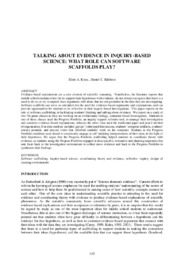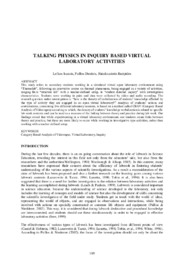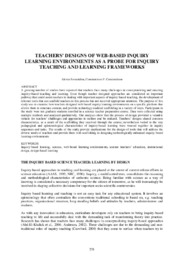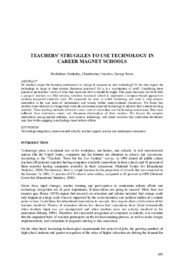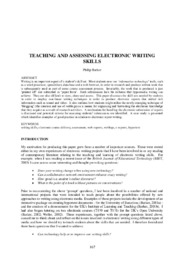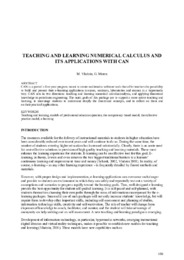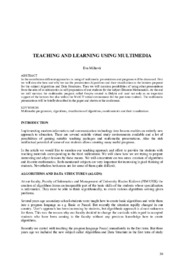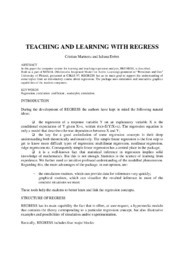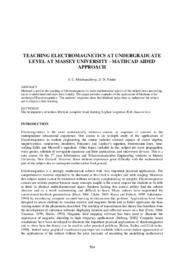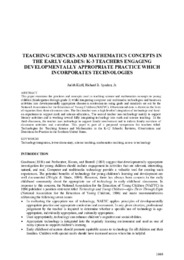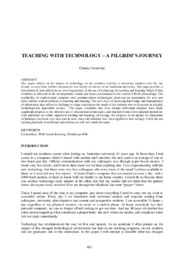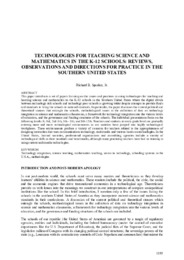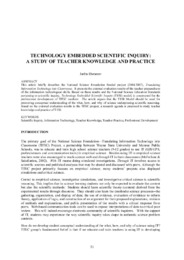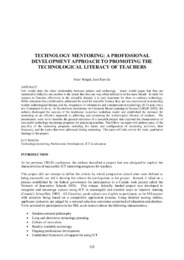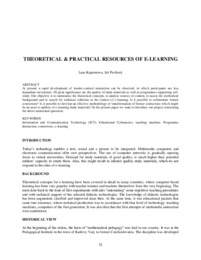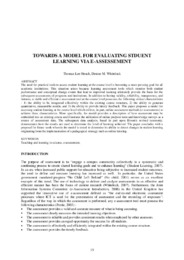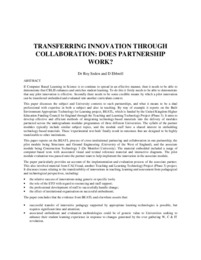Browsing Computer Based Learning in Science (CBLIS) by Title
Now showing items 276-295 of 337
-
Talking about evidence in inquiry-based science: what role can software scaffolds play?
(Department of Educational Sciences, University of Cyprus, 2003)Evidence-based explanations are a core element of scientific reasoning. Nonetheless, the literature reports that middle school students often fail to support their hypotheses with evidence, do not always recognize that ... -
Talking physics in inquiry based virtual laboratory activities
(University of Cyprus, 2010)This study refers to secondary students working in a simulated virtual open laboratory environment using “Thermolab”, following an innovative course on thermal phenomena, being engaged in a variety of activities, ranging ... -
Teachers’ designs of web-based inquiry learning environments as a probe for inquiry teaching and learning frameworks
(University of Cyprus, 2010)A growing number of studies have reported that teachers face many challenges in conceptualizing and enacting inquiry–based teaching and learning. Even though teacher designed approaches are considered an important pathway ... -
Teachers’ struggles to use technology in career magnet schools
(Department of Educational Sciences, University of Cyprus, 2003)Do teachers expect the learning environment to change in response to new technology? Or do they expect the technology to adapt to their routine classroom practices? Or is it a combination of both? Underlying these questions ... -
Teaching and assessing electronic writing skills
(University of Zilina, 2005)Writing is an important aspect of a student’s skill set. Most students now use ‘information technology’ tools, such as a word processor, spreadsheet, data base and a web browser, in order to research and produce written ... -
Teaching and learning numerical calculus and Its applications with can
(Department of Educational Sciences, University of Cyprus, 2003)CAN is a part of a five-year program meant to create multimedia software tools that offer teachers the possibility to build and present their e-learning applications (courses, seminars, laboratories and exams) in a hypermedia ... -
Teaching and learning using multimedia
(Department of Educational Sciences, University of Cyprus, 2003)In the contribution different approaches to using of multimedia presentations and programs will be discussed. First we will describe how and why we use the presentation Algorithms and their visualisation in the lectures ... -
Teaching and learning with regress
(Pedagogical Faculty of University of Ostrava, 2001)In this paper the computer system for learning and teaching regression analysis, REGRESS, is described. Built as a part of MIMAL (Multimedia Integrated Model for Active Learning) generated at “Petroleum and Gas” University ... -
Teaching electromagnetics at undergraduate level at massey university - mathcad aided approach
(University of Zilina, 2005)Mathcad is used in the teaching of Electromagnetics to make mathematical aspects of the subject more interesting, easier to understand and more user friendly. This paper presents examples of the application of Mathcad to ... -
Teaching logic programming from a distance: an approach
(Department of Educational Sciences, University of Cyprus, 2003)In this paper a Networked Learning environment is presented for teaching Logic Programming from a Distance. After a short introduction to the Networked Learning approach to Open and Distance Learning, we present the reasons ... -
Teaching sciences and mathematics concepts in the early grades: k-3 teachers engaging developmentally appropriate practice which Incorporates technologies
(Department of Educational Sciences, University of Cyprus, 2003)This paper examines the practices and concepts used in teaching science and mathematics concepts to young children (kindergarten through grade 3) while integrating computer and multimedia technologies and hands-on activities ... -
Teaching with technology – a pilgrim’s journey
(University of Zilina, 2005)This paper reflects on the impact of technology on the academic activity of university teachers over the last decade, as seen from within a department in a faculty of science of an Australian university. The paper provides ... -
Technologies for teaching science and Mathematics in the k-12 schools: reviews, observations and directions for practice in the southern united states
(Department of Educational Sciences, University of Cyprus, 2003)This paper introduces a set of papers focusing on the issues and practices in using technologies for teaching and learning science and mathematics in the K-12 schools in the Southern United States where the digital divide ... -
Technology embedded scientific inquiry: a study of teacher knowledge and practice
(University of Cyprus, 2007)This article briefly describes the National Science Foundation funded project (2004-2007), Translating Information Technology into Classrooms. It presents the external evaluation results of the teacher preparedness of the ... -
Technology mentoring: a professional Development approach to promoting the Technological literacy of teachers
(University of Cyprus, 2007)Few would deny the close relationship between science and technology – many would argue that they are inextricably linked to one another to the extent that they are very often referred to in the same breath. In order ... -
Telecommunications technologies and Curriculum development: the case of a virtual High school project
(Department of Educational Sciences, University of Cyprus, 2003)In this paper we present the lessons we learned from developing online classes for a virtual high school (LUDAVHS) project and discuss the implications for teaching science using telecommunication technologies. Emphasis ... -
Theoretical & practical resources of e-learning
(Department of Educational Sciences, University of Cyprus, 2003)At present a rapid development of learner-centred instruction can be observed, in which participants are less dependent on teachers. Of great significance are the quality of study materials as well as programmes supporting ... -
A tool to support interaction and collaboration analysis of learning activities
(Department of Educational Sciences, University of Cyprus, 2003)An increasing amount of data is collected today during studies in which students and educators are engaged in learning activities using information technology and other tools. These data are indispensable for analysis ... -
Towards a model for evaluating stduent learning via e-assessement
(University of Cyprus, 2010)The need for practical tools to assess student learning at the course level is becoming a more pressing goal for all academic institutions. This situation arises because learning assessment tools which monitor both student ... -
Transferring innovation through Collaboration: does partnership Work?
(Pedagogical Faculty of University of Ostrava, 2001)If Computer Based Learning in Science is to continue to spread in an effective manner, then it needs to be able to demonstrate that CBLIS enhances and enriches student learning. To do this it firstly needs to be able to ...
